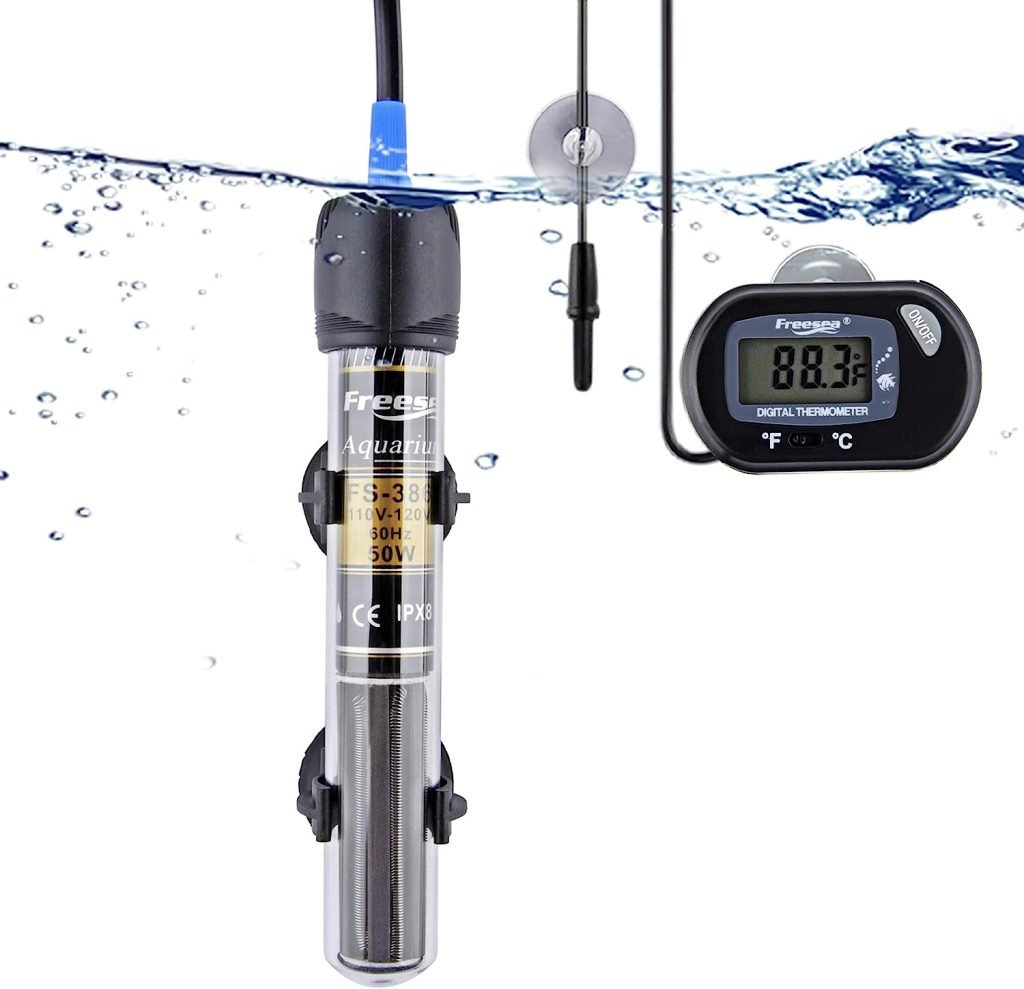Do Guppies Need A Heater?
The Complete Answer For Those Planning and Current Tank Owners.
Do guppies need a heater?
I don’t like long introductions.
So whether you are planning a guppy fish tank and already have one and may experiencing trouble with it, today I’ll help you figure out:
Yes, Guppies Need A Heater.
Guppies are tropical fish that need a constant temperature between 78-82 to thrive.
The magic word here is “constant”. It’s not so much about the window, as it is about the consistency. Big swings in temps cause major stress or even send your guppies into shock- which is very likely to kill them.
Do Guppies Need A Water Heater: In Review
Guppies In The Wild
Before we dive into the topic, let’s take a moment to understand the natural habitat of guppies.
Guppies are native to tropical regions, such as South America and the Caribbean. In their natural environment, these fish inhabit warm waters with temperatures ranging from 75°F to 82°F (24°C to 28°C).

These waters are typically warm and stable, allowing guppies to thrive and reproduce.
Guppies At Home
But unlike their natural habitat, aquarium water temperature can fluctuate.
Here are just a few reasons why:
- Room temperature fluctuations
- Seasonal changes
- Absence of natural heating sources.
- The tank was placed by a window (that’s a no-no)
- The tank is placed near a hot pipe or an AC blow path
Water temperature fluctuation is a way bigger threat than just the wrong water temperature. A sudden change in temps can send guppies into shock, and even cause death.
And this is still just one argument as to whether guppies need a heater.
The wrong water temperatures can also open the door to most guppy diseases.
Do Guppies Need a Heater: How Much They Cost
Up $30, although it will depend on the size of your tank.
You can find many models that can accommodate up to a 10-gallon tank in the $11 to $16 range.
The bigger the tank- the less you’ll spend per gallon.
When researching for this article I’ve found great heaters that cost less than $25 for tanks up to 75 gallons.
Pro's And Cons Of A Guppy Water Heater
Let’s take a closer look at why getting a heater makes sense.
Here are the pros of cons to answer the question: “Do guppies need a water heater?”
Pros
- Help maintain a strong immune system so your guppies can fight illnesses
- Reduce the risk of stress, which can kill
- Save time- healthier fish mean less time spent healing them.
- Is the overall thing to do.
Cons
- Cost of equipment and recurring electricity charge
- Usually only come in one color
Do Guppies Need A Heater: Pros
Temperature Control
The primary advantage of using a water heater is the ability to maintain a consistent and precise water temperature.
Guppies are sensitive to temperature fluctuations, and a heater ensures that the water remains within their preferred range of 78-82°F (25-28°C).
This stable environment promotes their health and enhances their vibrant colors and active behavior.
Adjustable Temperature and Thermostat
Opt for a water heater with an adjustable temperature setting and an accurate thermostat.
A heater with precise temperature control ensures you can set and maintain the perfect environment for your guppies.
Some heaters come with built-in thermostats, while others require a separate thermometer to monitor the water temperature accurately.
Ideal Tropical Habitat
By providing a warm and tropical environment, a water heater allows guppies to thrive and display their natural behaviors.
Warm water promotes proper metabolism, digestion, and overall well-being, which can lead to better growth and breeding success in your guppy fish tank.
Seasonal Flexibility
In colder climates or during winter months, a water heater becomes especially beneficial.
It helps counteract the low ambient temperatures and keeps the water warm even when the room temperature drops, ensuring your guppies remain comfortable throughout the year.
Health and Immunity
Warm water promotes a robust immune system in guppies, making them less susceptible to diseases and stress-related illnesses.
A consistent temperature can also speed up recovery if your guppies fall ill, as warm water aids in healing and boosts their immune response.
Do Guppies Need A Heater: Cons
Electricity Consumption
Using a water heater will increase your electricity consumption, as it requires power to maintain the desired temperature.
Although modern heaters are more energy-efficient, this added electrical load can contribute to higher utility bills, especially if you have multiple aquariums or large tanks.
With that in mind, the cost to maintain water temp on a 10-20 gallon tank is going to be barely noticeable.
Overheating Risks
If the water heater malfunctions or lacks proper safety features, it can lead to overheating the tank water.
This poses a significant risk to your guppies’ health and can even be fatal.
Dependency on Equipment
Relying solely on a water heater for maintaining temperature may lead to dependency.
If the heater breaks down, the water temperature can rapidly drop, stressing the guppies.
It’s essential to have backup plans, such as a spare heater or an alternate heating method, to ensure your guppies’ safety.
The Best Guppy Water Heater
- Extra Compact Design- Specifically For Small Tanks
- Easy Installation- Just Attach The Suction Cup. Pre-Set To Guppy Temp of 78F Right Out The Box
- Not Adjustable Temperature.
- Thermostat Not Included

- Easy installation with suction cups.
- Compact design so it takes minimal space in the tank.
- 2 in 1- built in thermostat- so no other piece of equipment necessary.

How to Choose a Heater for Guppy Tank?
There are a couple of things to be aware of when looking for a guppy water heater.
While you can buy a kit that come ready with everything you might need, you may choose to get the separate pieces separately.
Let’s take a quick look into what to look for when shopping for a guppy water heater.
Tank Size and Heater Capacity
The first thing you want to consider is the size of your guppy fish tank.
That puts an average 20-gallon tank with a 100-watt heater.
Oversized heaters can lead to temperature fluctuations, while undersized ones may struggle to maintain the desired warmth.
Technology keeps improving with time, and fish tank heaters are no exception. What’s written above is a rule of thumb- so consider the manufacturer’s advice when choosing a guppy tank heater.
Safety Features
Safety should be a top priority when selecting a water heater for your guppy tank.
Choose a model with automatic shut-off capabilities when the water reaches the desired temperature, preventing overheating and possible damage to the heater.
Additionally, opt for a heater with a protective casing that shields the heating element, reducing the risk of burns to your guppies or other tank inhabitants.
Submersible and Unbreakable Design
I might sound like Captain obvious here, but choose a submersible water heater that can be fully submerged in the tank.
Submersible heaters are more efficient at evenly distributing heat throughout the water, ensuring a consistent temperature for your guppies.
Additionally, look for a heater made of durable and shatterproof materials to avoid any accidents or potential harm to your fish.
Consider Those 6 Things To Ensure a Thriving Tank
In order to achieve the same conditions that are found in nature you would most likely want to use a heater.
We’ll explore in detail the pros and cons of fusing a heater, but now let’s focus on other factors that can help you achieve an environment that’s as close as possible to the one in nature.
Temperature and pH
Maintain the water temperature between 78-82°F (25-28°C) and keep the pH level slightly alkaline, around 7.0 to 8.0.
You can achieve the right PH levels with a good water conditioner.
Filtration
Install a suitable filtration system to keep the water clean and clear. Guppies prefer gentle water flow, so choose a filter that doesn’t create strong currents that may stress them.
you want to get a bump that can move your entire tanks gallons at least six times an hour. If you have a 10 gallon tank you’ll want 60 gallon per hour pump.
With that said if you find that the currents from the pump are too strong and the guppies are not swimming freely around the tank, you may need to reposition the pump so the currents aren’t as obstructive.
Aquascape with Plants

Include live aquatic plants like Java moss, Amazon sword, or water wisteria. These plants provide hiding spots, oxygenate the water, and create a natural environment that resembles guppies’ native habitat.
Guppies are natural munchers, meaning they like to gnaw on plants and other stuff to define around the tank around the clock.
Substrate
Use a fine-grain substrate like sand or gravel, which mimics the sandy or rocky bottoms found in their natural waters.
Avoid sharp or rough substrates that could injure the guppies.
Also, incorporate driftwood and smooth rocks into the tank to mimic natural hiding places and territories for the guppies.
Lighting
Provide a light source that replicates natural day-night cycles. You can check out our lighting guide over here.
Use a timer to ensure consistent lighting periods, approximately 10-12 hours of light followed by darkness.
And avoid placing your tank near a sunny window.
While that sounds like a good solution for lighting, it will create highly fluctuating temperatures and might overheat the tank altogether.
Group Size
Guppies are social fish, so keep them in groups of at least five or more. This will create a more natural and cohesive social structure in the tank.
Avoid overcrowding though, as too many guppies in one tank will inevitably compete for food and oxygen in the water and create a stressful environment.
That would lead to less healthy fish and a lot more work for you as you’ll need to change the water a lot more frequently.

